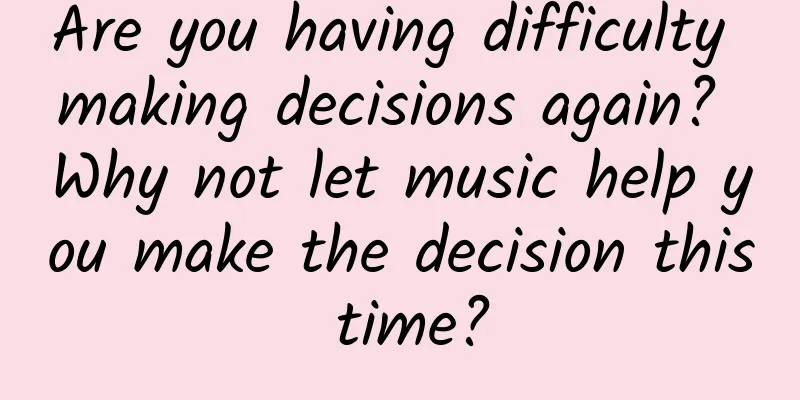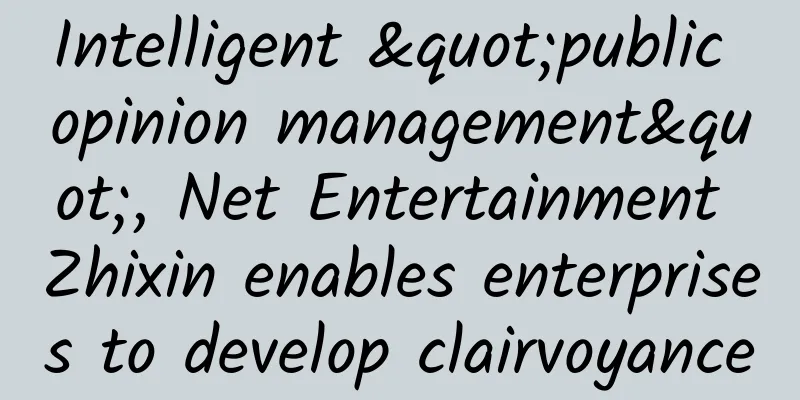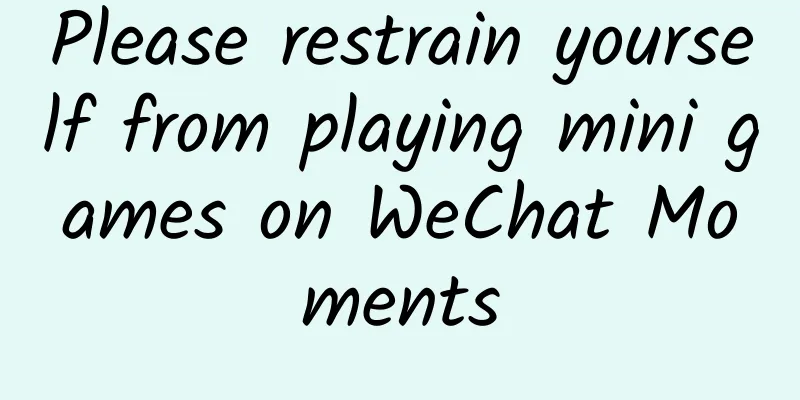Are you having difficulty making decisions again? Why not let music help you make the decision this time?

|
In the past two years, the classic line "I have heard a lot of truths, but I still can't live a good life" resonated with many friends. In other words, we know what is the right choice, but we still short-sightedly choose the happiness of the moment and forget about the future. For example, between "successfully losing weight" and "having another bite of cake", many people tend to temporarily give up the sense of accomplishment brought by a slim figure and instead choose the instant pleasure brought by cream cake. Image source: Veer Gallery Are you trying to find a high-sounding excuse for your behavior? Well, there is actually a professional term in psychology to explain this behavior: intertemporal choice. 01 I should have a big dinner tonight Or a weekend dinner? Intertemporal choice refers to how to choose between two options when you can get different levels of benefits (or suffer different levels of losses) at a near time point (such as now) or a far time point (such as the future). For example, "give you 100 yuan now" and "give you 1,000 yuan in two weeks (or even longer)", which one would you choose? Image source: Adapted from Frontiers In life, we often need to control our desires and satisfy them later, which is called "delayed gratification". Delayed gratification belongs to the category of "intertemporal choice". Compared with enjoying a big meal tonight, the appeal (value) of a delayed meal is discounted. Psychologists call this tendency to discount the value of delayed gains time discounting. The greater the time discount, the less we can accept delayed gratification. But many times, we also need to borrow the power of will (a moral effort) to delay gratification in order to gain more happiness. Metcalf and Mitchell of Columbia University proposed a dual-system model to explain this process of self-control or "willpower." The model argues that there is a rational "cold" system and an emotional "hot" system. The balance between the cold and hot systems is determined by stress, developmental level, and the self-regulatory dynamics of the individual. “Hot” systems can induce people to make automatic choices Image source: Reference [1] So, how does the emotional "heat" system affect our intertemporal choices? Some studies have found that compared with negative emotions, positive emotions make experimental volunteers behave more short-sightedly, that is, they tend to choose to gain benefits at a near time point; however, some studies have found the opposite result, that is, negative emotions make people short-sighted, while positive emotions do not. There are many possible reasons for the conflicting conclusions. For example, we cannot be sure whether the effects of emotions lasted long enough in these experiments, or whether the effects of emotions were natural enough. 02 Play Good Luck I see who is not excited When it comes to emotional changes, we may have had this experience: when we hear the beat of cheerful dance music, we will shake our heads unconsciously; when we hear a familiar tune in a foreign country, we can't help but burst into tears. The ability of humans to experience emotions in music may be innate: newborns like harmonious music and can distinguish between happy and sad music at 9 months old. Music is good at depicting and evoking subtle changes in emotions and is considered an art of emotion. Listen to happy music Image source: veer gallery GIF listening to sad music Image source: Giphy Although from the perspective of biological evolution, music does not seem to increase the probability of human survival, in today's society, music is everywhere and it is difficult for us to imagine life without music. In addition, the basic emotions expressed by music are also cross-culturally universal, and these basic emotions are related to specific musical form characteristics. For example, happy music is usually in major keys, fast, high in pitch, with simple and harmonious harmony, smooth and fluent rhythm, small speed variability, many pitch changes, wide in pitch range, and ascending pitch; sad music is usually in minor keys, slow, low in pitch, dissonant, with small intervals, narrow in pitch range, and descending pitch. Image source: Veer Gallery Importantly, music is also an art of time. Good music works need to be planned from the beginning, just to present a brilliant and perfect ending at the end of the music. In terms of crossing time, music seems to have reached a tacit understanding with cross-period choices. So, can music affect our perception of time and then affect the decisions we make? 03 The magic of music Excitement is the driving force behind decision making Not long ago, researchers from the Institute of Psychology of the Chinese Academy of Sciences and the School of Music of Shanghai Normal University collaborated to explore the impact of music on intertemporal choices. They examined the emotional responses of experimental volunteers while listening to music, as well as their intertemporal choice behaviors during the process of listening to music. The study used three types of background sounds: happy music (fast, major key), sad music (slow, minor key), and white noise. Random noise with the same energy density at all frequencies is called white noise. Image source: Baidu Encyclopedia The experiment found that compared with white noise, happy music makes people feel that the time distance between the present and the future is farther, while sad music makes people feel closer to the future. More importantly, this time perception further affects intertemporal choices: listening to happy music makes people more willing to bet on the present (for example, getting 100 yuan immediately); while listening to sad music makes people more willing to bet on the future (for example, getting 200 yuan in one month). Image source: Reference [2] Interestingly, this musical effect seems to have nothing to do with the pleasure we feel, but more to do with arousal. The researchers found that the mode of the music mainly affects the pleasure of the emotion, while the speed of the music mainly affects the arousal of the emotion. In order to eliminate the influence of pleasure, the researchers tried to reverse the mode of the music but keep the speed of the music. The results showed that fast music did not make the volunteers happier, but increased their excitement level. The high excitement level made them feel that time was flowing slower and the future was more distant, so they were more inclined to give up the choice of the future. On the contrary, slow music reduced the excitement level of the volunteers, and time seemed to pass faster, making them more willing to wait for the future. Image source: Reference [2] The researchers tried adjusting the tempo of the music to a moderate tempo, but kept the original key. This time, the music no longer influenced the volunteers' choices. Image source: Reference [1] This study is the first to link time, decision-making and music, explaining how music changes our perception of time and thus affects our behavioral decisions. When faced with many decisions, people tend to adopt a single strategy: when the time distance between the present and the future is not so far, they will directly "equalize" the difference between the two in the time dimension and no longer give a time discount to future choices, making the choice between different time points simpler. We realize that human’s choice strategy is so direct and efficient, and this “equal and different” solution explains human decision-making behavior simply and clearly. Material abundance often allows us to make choices that seek instant gratification, but can this "easy" happiness completely replace the dignity that a sense of accomplishment brings us? The world is never short of beautiful music. Reflecting on music and rationally examining the power and value of time may help us make better choices. Produced by: Science Popularization China Author: Avocado Producer: Computer Network Information Center, Chinese Academy of Sciences This article is produced by the Science Popularization China Frontier Technology Project. Please indicate the source as Science Popularization China when reprinting. The pictures in this article are from the copyright gallery and are not authorized for reproduction. References: [1] Metcalfe, J., & Mischel, W. (1999). A hot/cool-system analysis of delay of gratification: Dynamics of willpower. Psychological Review, 106(1), 3–19. https://doi.org/10.1037/0033-295X.106. [2] Zhou, L., Yang, Y.*, & Li, S.* (2022). Music-induced emotions influence intertemporal decision making. Cognition and Emotion, 36(2), 211–229. https://doi.org/10.1080/02699931.2021.1995331 |
<<: Why do I feel more beautiful after taking a shower?
>>: Global poverty seen from space: 19% of human settlements have no light at night
Recommend
14,000 apps were removed from the shelves at the same time, and Apple once again triggered a delisting storm!
Yesterday (May 6), the trend of apps being remove...
2014 TOP100 Open Source Software
I don't know when it started, but many people...
Case Study: Event Operations Planning Process
The online learning platform built based on moder...
I seem to have been diagnosed with "back-to-school anxiety disorder". Can I take sick leave?
Review expert: Chen Mingxin, national second-leve...
What secrets does the observatory in "La La Land" hide?
Author: Du Lian Audit│Ding Yi Editor: Zhao Jingyu...
Deep sea warning! Let's talk about our "fear below the sea level"
The blue ocean makes people feel relaxed and happ...
"91 Ten Articles" - A daily must-read briefing for the new energy vehicle industry (210304)
1. Following Huawei, traditional communications g...
Sad! 10 children died and 3 are still missing! It’s the peak season again…
Around 4 p.m. on June 26, Lingao County, Hainan P...
Baidu Video Domination Training Camp 8.0
History Update: 01. Ceremony 02. Store opening 03...
What can Uber learn from Airbnb in international expansion?
As Silicon Valley's hottest startups with a v...
How does online education build a private traffic system?
Traffic costs are becoming more and more expensiv...
Count down 8 types of operation tools you must learn
As the saying goes, if you want to do your work w...
Advertising skills on Weibo, Momo and other information flow platforms
What is information flow advertising? Information...
There will be frequent cold air in the next ten days, and there will be sandstorms in these places!
Recently, snowfall occurred in Qinghai, Heilongji...
The image of the red-crowned crane has collapsed? The fairy-like and beautiful crane is actually bald?
What? The image of the red-crowned crane has coll...









